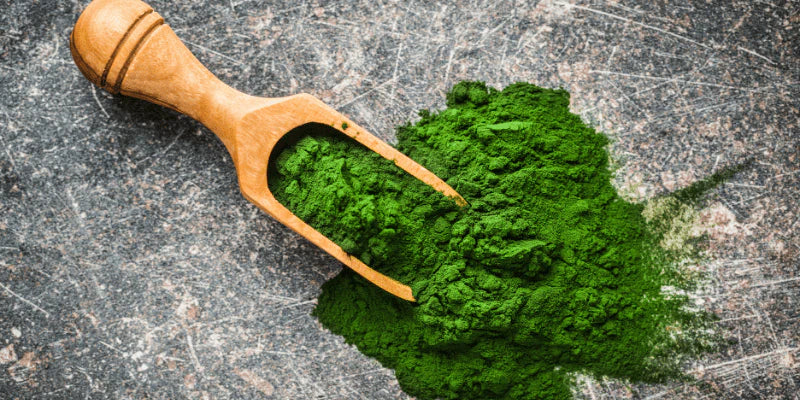CHLORELLA - EVERYTHING YOU NEED TO KNOW
WHAT IS CHLORELLA?
Chlorella comes from Latin and means "small, green thing". It is a microalgae that belongs to highly developed living organisms. The algae cannot be seen with the naked eye, but they have valuable powers and survived for millions of years. Chlorella is one of the most studied organisms. For this reason, there is a lot of research on the health effects of alga. The best-known type of freshwater algae is Chlorella Vulgaris. It is spread worldwide and is found mainly in stagnant and flowing waters. The microalga is mainly used in food supplements and cosmetics. (Chlorella, uses, side effects, and more)

WHICH VITAMINS DOES CHLORELLA CONTAIN?
Chlorella has a unique nutritional value due to the high content of proteins, fatty acids and secondary plant compounds. It contains all water-soluble vitamins (B1, B2, B3, B5, B6, B9, biotin and vitamin C), fat-soluble vitamins (A, D, E, K) and many other bioactive plant substances (Microalgae in Health and Disease Prevention) (Chlorella, uses, side effects and more).
It also contains some minerals such as calcium, magnesium, potassium and sodium. Chlorella is also rich in trace elements such as iron, zinc, manganese, copper and selenium. The freshwater algae is a significant source of protein and is also iodine-free (Microalgae in Health and Disease Prevention).
But our Eat Your Super Greens Vitamins also contain chlorella.
EFFECTs OF CHLORELLA
Chlorella has a very high chlorophyll content. Such a high concentration has never been measured in any other plant. Because chlorophyll is identical to the human blood pigment haemoglobin, there is no better nutrient for our blood. Along with organic minerals, chlorophyll ensures our blood is clean and vital. This is the only way the blood can nourish all body tissues in the best possible way.
Due to the high amount of chlorophyll, chlorella protects the liver from countless toxins. The fibre of the alga strengthens the circulatory system as well as the digestive system. In addition, it activates carbohydrate metabolism by accelerating glucose transport so that the obtained energy is available more quickly. It also assists in restoring the acid-base balance. Chlorella can positively affect the appearance of the skin in various ways; it can improve wound healing or help with inflammatory skin diseases, such as acne or neurodermatitis (Microalgae in Health and Disease Prevention).
The algae also positively affects the immune system and can protect the body from bacteria, viruses or fungi when taken continuously. It also positively affects blood formation and can reduce high blood pressure. In addition, senile dementia can be slowed down, and chlorella supports kidney function and can prevent DNA damage (Chlorella, uses, effects and more).

NASSIM JAMALZADEH:
"Chlorella is not just a microalgae. You can not underestimate its effect. Because it is rich in beta-carotene, vitamins B1, B2, B3, B5, B6, E and vitamin K. So, it plays a great role, among others, for the immune system and the nervous system. It also has an antioxidant effect and can protect cells from oxidative stress. If you don't know about chlorella yet, you should definitely try it and be convinced of its effects."
FAQs about chlorella
FAQs about chlorella
The daily recommended amount of chlorella for a relatively healthy person is 3-4g. For higher needs, 5-10g (or more) should be consumed. However, sensitive people should take less (2-3g) chlorella in the beginning and slowly increase the daily amount. The intake of capsules, powder or gummy bears should be spread throughout the day. It is also important to drink two liters of water a day, so that the body can quickly absorb the nutrients and vital substances.
Chlorella is generally considered to be well tolerated. Side effects are hardly known; occasionally headaches or nausea may occur during the first weeks of intake. People taking anticoagulants should be careful when taking chlorella, as vitamin K can counteract the effect of anticoagulants. (Chlorella, uses, effects and more)
The two terms are often used together. However, spirulina is not actually an algae but a genus of cyanobacteria. In addition, chlorella has a nucleus, while spirulina does not. Unlike Spirulina, Chlorella belongs to plants from a botanical perspective. Both have high nutrient density and high protein content.
Chlorella can help to reduce excess weight. Scientists discovered during studies that chlorella showed a positive result after taking it for 8 weeks. The experiment showed that people who took chlorella tablets daily for 8 weeks lost more weight than the test subjects in the placebo group.
STUDIES ON THE IMPORTANCE OF CHLORELLA
We provide you with the following scientific studies for general information. The results obtained in them do not necessarily occur in all people. Feel free to click on the corresponding links to get more detailed info.
The importance of chlorella in nutrition
Chlorella has been extensively studied to yield biomass or extract bioactive compounds that can be used in functional dietary supplements, cosmetics, and pharmaceuticals.
The health benefits of chlorella
The study focuses on the composition of chlorella, its health benefits, current and future market, and its current approval status in the U.S. and EU.
The safety of consuming chlorella.
The study found that the algae consumed without problems when properly grown in a non-contaminated environment and consumed in moderation.
Synergistic effects between multiple nutrient and antioxidant compounds.
The study investigated whether the beneficial effects of chlorella were due to synergistic effects between several nutrients.
Let customers speak for us
Our bears with chlorella
Our bears with chlorella


















